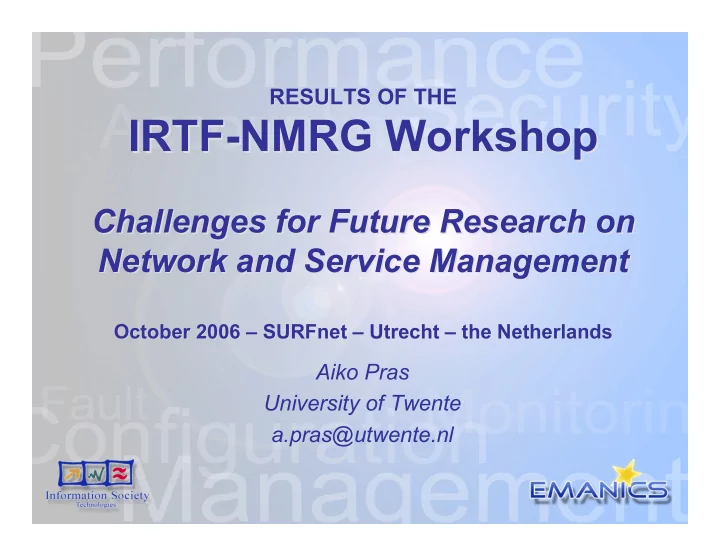

RESULTS OF THE RESULTS OF THE IRTF-NMRG Workshop IRTF-NMRG Workshop Challenges for Future Research on Challenges for Future Research on Network and Service Management Network and Service Management October 2006 – October 2006 – SURFnet SURFnet – – Utrecht Utrecht – – the Netherlands the Netherlands Aiko Pras University of Twente a.pras@utwente.nl
Jointly organized by Jointly organized by IRTF/NMRG & EMANICS IRTF/NMRG & EMANICS IRTF/NMRG : • Chartered in 1999 (chair: Jürgen Schönwälder) 21 st meeting in Utrecht, 22 nd meeting tomorrow • • Foster discussion between IETF, operators and researchers EMANICS • European Sixth Framework Network of Excellence • 1 January 2006 -> 31 December 2009 • Management of the Internet and Complex Services
Workshop Goals Workshop Goals Goals: • Bring together researchers, operators, vendors and technology developers • Identify promising future directions of network management research. • Outcome should be a description of research directions that is felt worthwhile to explore in the next 5 years. Non-goal: • Define what management standards are needed now
Workshop Organization Workshop Organization • Invitation via NMRG list to submit position statements • 20 participants : – Alcatel/Lucent, Avaya, Cisco, Ericsson, HP, Huawei, NEC – Orange France Telecom, Korea Telecom, Switch, Tiscali – Researchers from EMANICS, as well as from elsewhere – 60% from Europe • Day 1: presentation / discussion of position statements • Day 2: parallel vendor / operator / researcher sessions • Day 2: plenary discussion of session results
Research challenges Research challenges • Management models • Distributed monitoring • Data analysis and visualization • Economic aspects of management • Uncertainty and probabilistic approaches • Ontologies • Behavior of managed systems
Management models Management models • We understand: – Manager-Agent approach (client-server) – Hierarchical management (DisMan, TMN) • We do not understand – Fully distributed management (P2P, ad-hoc) – Self-* technologies (auto-configuration, stability of control loops)
Distributed monitoring Distributed monitoring • Examples of what is needed: – track number/quality of VoIP calls – find best proxies / peers (P2P) • Goal: a lightweight, distributed monitoring layer offering aggregates of local info to applications – Sum, average, extreme, percentile, histogram, … – Difficulty: bandwidth and CPU usage -> lightweight! – Find trade-offs – Tree-based versus gossip-based protocols
Data Analysis and Visualization Data Analysis and Visualization • We can create: – Topology maps for small networks – Static time series plots • We have problems with: – Maps for large, multi-layer networks – Online analysis at Tbps – Visualization of anomalies – Real-time, interactive visualization techniques (zooming, filtering, correlating)
Economic Aspects Economic Aspects • Most researchers focus on technical solutions • Limited research into the operational costs of such technologies: – IntServ/DiffServ versus overprovisioning • Research needed on models to estimate costs • Network management is risk management
Uncertainty and Probability Uncertainty and Probability • Many researchers focus on deterministic approaches • Scalability problems force us to rethink in terms of uncertainties and probabilistic approaches: – Probabilistic SLAs / statistical guarantees – Manager may not have a complete overview • How to decide between probabilistic and deterministic approaches?
Ontologies Ontologies • Data modelling is believed to be understood • Research is needed: – If / how ontologies can be effectively used to automate the implementation of management interfaces – If/how ontologies can help to check / enforce policies and behaviour
Behavior of Managed Systems Behavior of Managed Systems • Management models usually represent state: – MIBs, CIM • Research is needed to model and manage behavior: – Normal versus abnormal behavior – Detect resource failure, intrusions, … – Design self-stabilizing systems
Concluding remarks Concluding remarks • Presentation is: – Summary of what was discussed at workshop – Represent interest of workshop attendees – http://www.ibr.cs.tu-bs.de/projects/nmrg/ • Follow-up: – Internet-Draft (being written) – Submit overview article to IEEE ComMag – Further discussion: tomorrow’s IRTF/NMRG meeting
Recommend
More recommend